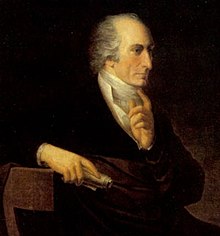Friedrich Heinrich Jacobi
| Friedrich Heinrich Jacobi | |
|---|---|
 |
|
| Born |
25 January 1743 Düsseldorf, Electorate of the Palatinate, Holy Roman Empire |
| Died | 10 March 1819 (aged 76) Munich, Bavaria, Germany |
| Era | 19th-century philosophy |
| Region | Western Philosophy |
| School | German Idealism |
|
Main interests
|
Common Sense Realism, Religion, Metaphysics, Moral Philosophy |
|
Notable ideas
|
Glaube, Offenbarung, Nihilism |
|
Influences
|
|
|
Influenced
|
|
Friedrich Heinrich Jacobi (German: [jaˈkoːbi]; 25 January 1743 – 10 March 1819) was an influential German philosopher, literary figure, socialite, and the younger brother of poet Johann Georg Jacobi. He is notable for popularizing the term nihilism (coined by Obereit in 1787) and promoting it as the prime fault of Enlightenment thought particularly in the philosophical systems of Baruch Spinoza, Immanuel Kant, Johann Fichte and Friedrich Schelling. Instead of speculative reason, he advocated Glaube (variously translated as faith or "belief") and revelation. In this sense, Jacobi anticipated present-day writers who criticize secular philosophy as relativistic and dangerous for religious faith. In his time, he was also well-known among literary circles for his critique of the Sturm and Drang movement, and implicitly close associate Johann Wolfgang von Goethe, and its visions of atomized individualism. His literary projects were devoted to the reconciliation of Enlightenment individualism with social obligation.
He was born at Düsseldorf, the second son of a wealthy sugar merchant, and was educated for a commercial career, which included a brief apprenticeship at a merchant house in Frankfurt-am-Main during 1759. Following, he was sent to Geneva for general education. Of a retiring, meditative disposition, Jacobi associated himself at Geneva mainly with the literary and scientific circle of which the most prominent member was Le Sage. He studied closely the works of Charles Bonnet, and the political ideas of Jean-Jacques Rousseau and Voltaire. In 1763 he was recalled to Düsseldorf, and in the following year he married Elisbeth von Clermont and took over the management of his father's business.
...
Wikipedia
